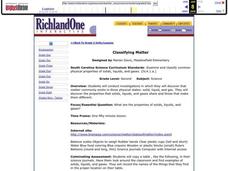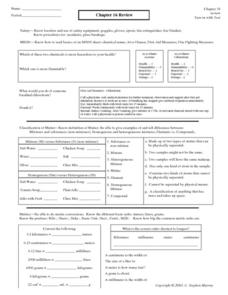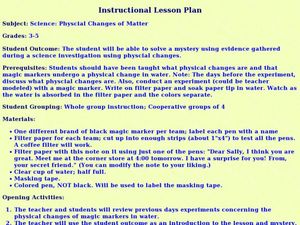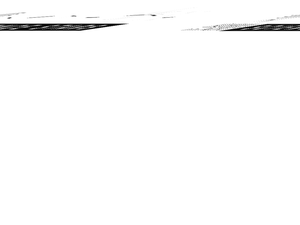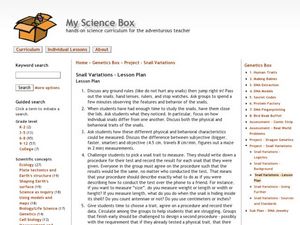Curated OER
Can You Get A Charge Out Of Matter?
Students observe and demonstrate how objects can be charged positively and negatively and how static electricity works. They observe a teacher-led demonstration, and in small groups rotate through various static electricity activities,...
Curated OER
Nothing New? A Physical Change
Fifth graders discuss the differences between chemical and physical changes. In groups, they complete experiments and discover how a physical chnage can be reversed. To end the lesson, they review the steps of the water cycle and...
Curated OER
Exploring Phases of Matter
Students discuss and experiment with the phases of water. In this phases of matter lesson, students recognize the different states of matter. Students measure and record changes and understand when the state changes.
Curated OER
Atoms: The Building Block of Matter
Young scholars examine how scientific theories are developed. In this matter lesson, students explore the basic idea of quantum theory. They create a timeline of scientists, their contributions, and discoveries.
Center for Learning in Action
Gases
Explore the properties of gases through one activity and two investigations in which super scientists observe the changes gas makes when encountering different conditions.
Massachusetts Institute of Technology
Lego Atoms and Molecules: Chemical Reactions
Show young chemists what a chemical reaction looks like with two parts of a hands-on experiment. First, learners conduct a wet lab where they observe the reactants (baking soda and calcium chloride, with phenolsulfonphthalein) before,...
Curated OER
Chemical or Physical Change?
Eighth graders participate in several science activities to note chemical or physical changes after discussion. They understand that all matter has definite structure which determines physical and chemical properties.
Curated OER
Matter
Third graders are introduced to the topic of matter. As a class, they brainstorm what they already know about matter and its properties. After completing a worksheet, they participate in an experiment in which they observe matter in...
Curated OER
Changes In Matter, "The Big Chill"
Third graders investigate why ice cream does not go through any chemical changes when it is exposed to physical changes. They describe the three states of matter in either written or verbal form. Then students experiment with ice cream...
Curated OER
Properties of Matter
Third graders explore forms of matter through reading, hands-on science activities, and research using the Internet. Students create a booklet, directions given, that they title and decorate, to later serve as a review visualization...
Curated OER
Classifying Matter
Second graders conduct investigations to explore matter. In this states of matter instructional activity, 2nd graders complete four activities to analyze the three states of matter. Students analyze the properties of solids, liquids, and...
Curated OER
Chapter 16 Review- General Science
In this review of general science learning exercise, students classify examples of matter as mixtures or substances, homogeneous or heterogeneous mixtures, or elements or compounds. Students also convert several examples using the...
Curated OER
Changes in Matter
Eighth graders, in groups, explain the difference between physical and chemical changes.
Curated OER
Physical Changes of Matter
Students solve a mystery using evidence gathered during a science investigation. In this physical changes lesson, students analyze a note written in marker to determine the physical changes the ink from the pen underwent. Students...
Curated OER
Physical and Chemical Changes in Matter
Students investigate chemical and physical changes. In this chemical and physical changes lesson plan, students distinguish between a chemical and physical change when observing baking bread and hot dogs and bagels cooking on a grill....
Curated OER
Hidden Science in Colonial Living
Fifth graders evaluate evidence that indicates a physical change has occurred. In this colonial living lesson, 5th graders explore the science involved in the making of items used in colonial life, such as, bread, butter, soap, candles,...
Curated OER
Physical and Chemical Changes
Students examine the different changes in matter. In this chemical change lesson students determine the amount of reactant made in a reaction using the law of conservation.
Curated OER
Changing Matter
Fifth graders conduct an experiment. In this changing matter lesson plan, 5th graders receive a cup of crystals, record their observations, add water to the crystals and record new observations. Students then discuss the differences...
Curated OER
Matter: Build a Word
Fourth graders examine matter and the periodic table of elements. In this matter lesson, 4th graders discuss atoms and their composition. Students explore the periodic table of elements and use it to spell words out of the elements.
Curated OER
Matter
Fifth graders investigate the structure of matter. They examine pictures of atoms and molecules and discuss their relationships, and construct a model of a molecule using toothpicks and gumdrops.
Curated OER
Phases of Matter
Pupils comprehend the different phases of matter. They give examples of each phase and describe the processes of changing between these phases. Students are asked what is plasma? They are asked what is the four phases of matter? ...
Curated OER
What Is the Matter with Water?
Second graders observe matter in all 3 states : liquid, solid and gas, in an ice cream soda. In teams, they are given ice and teams compete to be the first to melt their ice. Winner gets the ice cream soda. They draw examples of 3 states...
Curated OER
My Science Box
Students investigate snails and their physical and behavioral characteristics. In this investigative lesson students create a pie chart to show the results of their findings.
Curated OER
Physical/Chemical Properties of a Burning Candle
Students investigate the physical and chemical properties of a candle before and after it is lit. They conduct a burning candle experiment, and complete a KWL chart and worksheet, recording the results of the investigation.












